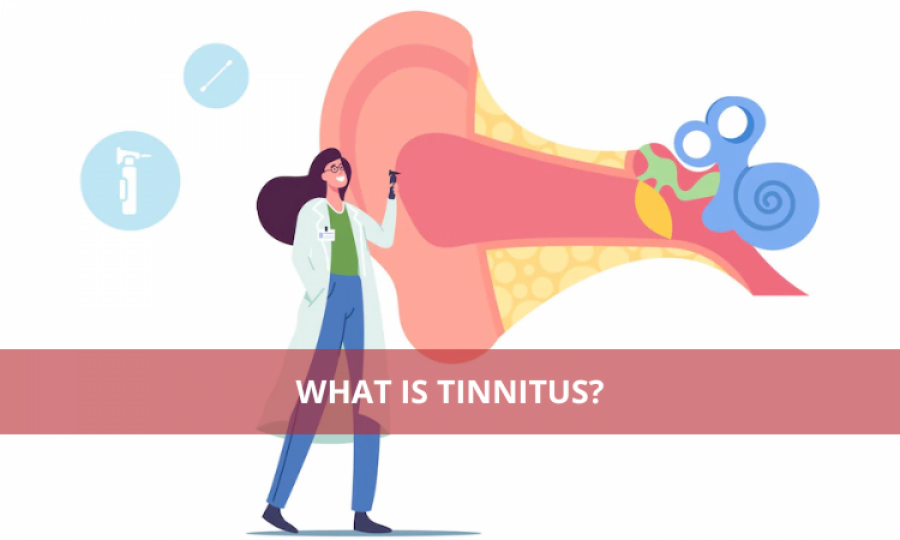What is Tinnitus?

Tinnitus is a term given to the sounds a person hears from internal rather than external sources. It is a sensorineural condition affecting hearing at the level of the cochlea. It is often described as a ringing in the ear but sounds like buzzing, humming, whistling, and grinding can also be heard. The ringing may be constant or intermittent, steady or pulsating. These conditions also make the ears more sensitive to sound; some people feel like their hearing has changed. It affects around 15% to 20% of people and is common in older adults.
Causes
Tinnitus is a sign of a problem in the auditory system. It affects one or both ears. Some reasons can be:
- Ear and sinus infections.
- Hearing loss.
- Hormonal changes.
- Brain tumors.
- Ototoxic medications include Aspirin, ciprofloxacin, tetracycline, chloroquine, cancer drugs, and some anticonvulsants.
- Ménière’s disease.
- Foreign object obstruction.
- Excessive earwax.
- Thyroid disorders.
- Pulsatile tinnitus because of anemia or high blood pressure.
Sometimes there is no cause, yet people experience ringing in their ears. Measures are then taken to reduce and limit the ringing sound.
Treatment and Diagnosis
There is no specific cure for this condition, but doctors rule out underlying causes through a medical checkup and history. The patient is asked to describe the sounds' severity, intensity, periodicity, and pitch. A hearing test is conducted, and a tympanometer is used to check ear drums. Furthermore, MRI or CT is also on the list of diagnostic tests. Musculoskeletal disorders like teeth grinding, clenching, and muscle tension can also make tinnitus noticeable. Any continuous and high-pitched ringing generally indicates problems in the auditory system. If there is no medical condition, the doctors use several methods to reduce the ringing in the ears. Hearing aids are used to provide relief from the ringing. Sound generators produce sounds and mask tinnitus. Some doctors employ relaxation techniques to reduce stress, making tinnitus more noticeable. Counseling is another option to reduce stress and pay less attention to tinnitus.
Prevention
Avoiding loud music and sounds can prevent tinnitus. Sometimes people suffer from short-lived tinnitus, which occurs after being exposed to deafening noises such as concerts. This short-term ringing goes away after a few days. If a person is habitually exposed to loud sounds, he should use protectors such as earplugs or earmuffs. Thorough medical checkups can detect any auditory canal problems, such as middle ear infections or tumors. Take care of your health and maintain a healthy lifestyle. Good sleep, diet, and exercise are essential. Any stressful conditions like depression, anxiety, or insomnia must be treated to reduce the severity of tinnitus. Any type of constant and chronic ringing in the ear must be reported to your healthcare provider. Avoiding these signs can worsen conditions.
In conclusion, tinnitus can become less noticeable and manageable with time. It must not be ignored as it can indicate any long-term ear problems which need to be treated. Minimizing sounds and the intensity of ringing is the management of tinnitus.
Trending
Popular
Sindh pledges vigorous action to prevent poliovirus transmission
-
PMA stresses health equity on World ...
04:08 PM, 9 Apr, 2024 -
Dow University’s new rabies vaccine ...
12:18 PM, 28 Mar, 2024 -
IRD role lauded in advancing ...
02:53 PM, 12 Mar, 2024 -
Over one billion people worldwide ...
09:48 AM, 5 Mar, 2024




